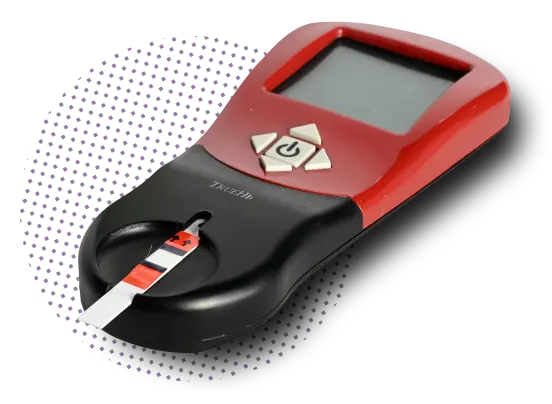Measuring hemoglobin regularly is vital in managing inflammatory bowel disease (IBD). It helps in early detection of complications and effective treatment planning, ultimately enhancing the patient’s health and quality of life.

Inflammatory bowel disease (IBD) is a disease which is characterized by chronic inflammation of gastrointestinal tract and occurs when immune system attacks our own intestinal cells. The two major types of IBD are Ulcerative colitis and Crohn’s disease (CD). A person with IBD has several clinical intestinal and extra-intestinal manifestations. Anemia is one of the most troublesome extra-intestinal manifestations that is characterized by a low hemoglobin level. A low level of blood oxygen in tissues leads to several other complications, such as tachycardia, hypoxia, and dyspnea, which are ultimately responsible for morbidity.
Individuals with IBD often exhibit iron deficiency anemia (IDA), resulting from chronic blood loss and reduced iron absorption due to tissue inflammation. The treatment options include oral and intravenous iron therapy and erythropoietin; however, the associated advantages and limitations of each of the above therapies should be taken into account by a healthcare provider. Patients with this condition should always have their hemoglobin levels checked regularly. It is estimated that one-third of patients with IBD have hemoglobin levels < 12 g/dl hemoglobin. According to the latest statistics, approximately 10 million people worldwide have IBD.
Hemoglobin measurement is an important part of monitoring the health of patients with IBD and anemia. It is required to:
TrueHb: Your accurate and reliable hemoglobin measurement partner!

Hemoglobin binds to nitric oxide (NO) and dilates the microvasculature, thus increasing the blood flow.
Improved hemoglobin levels increases the QOL in the patients with IBD.
Sacropenia is the progressive loss of muscle mass due to atrophy. The prevalence of sarcopenia is higher in people with decreased levels of haemoglobin, and it is estimated that about one-third of of patients with IBD have sarcopenia.
Hemoglobin levels can be used to assess the effectiveness of treatment for IBD. If hemoglobin levels are not improving with treatment, it may be a sign that the treatment is not working or that the disease is worsening.
In some cases, people with IBD may need blood transfusions to raise their haemoglobin levels. Hemoglobin levels can be used to guide the need for blood transfusions.
Immunosuppressive medications can suppress the immune system and help reduce inflammation in IBD. However, these medications also suppress the production of red blood cells. Hemoglobin levels can be used to monitor the risk of anemia in patients taking immunosuppressive medications.
TrueHb has been a lifesaver for me. Due to IBD and changing hemoglobin levels, I used to have to go to the doctor’s office every few weeks to get my hemoglobin checked, but now I can do it at home. It’s so much easier and more convenient
I have found TrueHb to be a very affordable way to manage anemia. The cost of the device is minimal. This makes it a great option for people on a budget
TrueHb is a valuable tool for anyone with anemia. It’s easy to use, accurate, and affordable. I highly recommend it to anyone with IBD

US Patented Technology | Instant Results | Wide range of measurement | Accuracy as per US CLIA guidelines
1. Rechargeable Battery
2. Accuracy as per USFDA CLIA guidelines
3. Wide Measurement Range 0-24 g/dl
4. Operating range 5-55°C
5. Two Years Shell Life of Strips
6. 23 Gauge lancets for accurate results
Yes, hemoglobin levels fluctuate in IBD.
In IBD, chronic inflammation of GIT leads to malabsorption of iron. This, in conjunction with bleeding from inflamed tissues, leads to the loss of blood and, ultimately, reduced haemoglobin levels.
As with most tests, it is typically conducted at a pathology lab. The drawback is that patients need to visit the lab, provide a 2-3 ml blood sample, and then wait for results, which usually take a few hours. On the other hand, TrueHb allows individuals to determine their hemoglobin levels within a minute from the comfort of their home using just a single drop of blood.
Chronic fatigue, vertigo, headache, shortness of breath, anorexia, and palpitation. If not controlled, it may lead to severe complications like angina.
Patients are given with oral iron supplements or parenteral supplements as per the patient condition. In a severe case, blood transfusion is preferred. Therefore, it is always advisable to regularly check for hemoglobin.
There is no fixed rule related to the frequency of hemoglobin monitoring in IBD, but once a week is usually sufficient. Moreover, the frequency depends on the patient condition.
The World Health Organization (WHO) criteria for anemia can be applied to patients with IBD. <13 g/dL in males, < 12 g/dL in non-pregnant females, and < 11 g/dL in pregnant females reflect anemia in IBD.
The normal range in males, females (non-pregnant), and pregnant females are 13 -18 g/dl, 12-16 g/dl, >11 g/dl, respectively.
Yes, the result of hemoglobin measured by TrueHb is truly reliable and accurate. The device has been validated by All India Institute of Medical Science (AIIMS).
Recognizing symptoms is vital for addressing hemoglobin deficiency. If you've noticed any symptoms, please share your email/phone number for symptom results for a free consultation with us if you are concerned about your health.
The content and information about the patented hemoglobinometer device displayed on this website are proprietary. Any unauthorized use, copying, or disclosure of this information, without explicit permission, is strictly prohibited and may result in legal consequences.
Customer Support : 1800 309 0932
Copyright @ TrueHb All rights reserved 2024